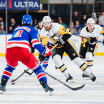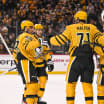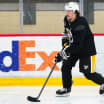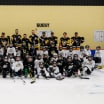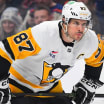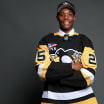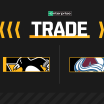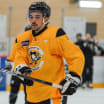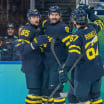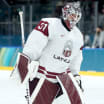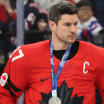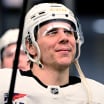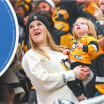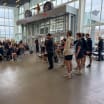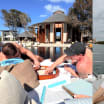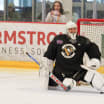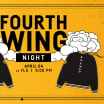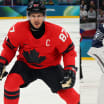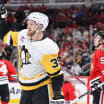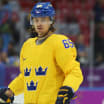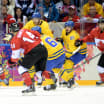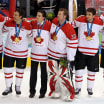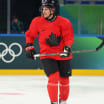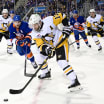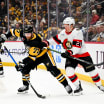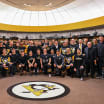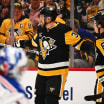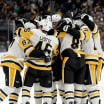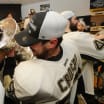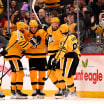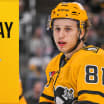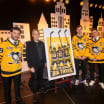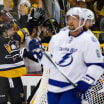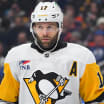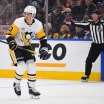Doc Emrick Reflects on Legendary Career and Ties to Pittsburgh
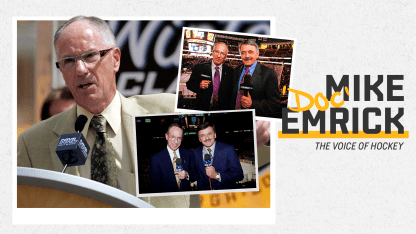
He called all three of Pittsburgh's Stanley Cup championships in 2009, '16 and '17, along with the most magical moments of Sidney Crosby's career, like his Golden Goal at the 2010 Winter Olympics.
In addition to that, Emrick has a number of neat ties to the city of Pittsburgh. He began his career covering the Penguins in the 1970-71 season as a freelance reporter with the Beaver County Times while teaching at Geneva College, and of course, has been a passionate Pirates fan ever since he was a kid.
So after Emrick, 74, announced his retirement last month following a magnificent 50-year career, he received a number of messages from members of the Penguins organization. Mario Lemieux, Sidney Crosby and Kris Letang all sent texts, with Mike Sullivan even writing a short letter that he mailed to Emrick's home in Michigan.
"He's just had such a huge impact on the game," Sullivan said. "As I said to him when I wrote him a short note, I can only share my personal experience, but Doc is part of the greatest moments of my professional career in witnessing an experience in the Stanley Cup runs, and Doc is the voice of those experiences.
"And you know, he carries himself with such dignity and grace with how he interacts with coaches and players, and he has such a way above him to articulate the game in such a unique way. We're all going to miss him. We're all going to miss him around the rinks. He's a pleasant person. And he's had such a positive influence on the game."
PittsburghPenguins.com took a trip down memory lane with Emrick to talk about his iconic career and those stops he made in the City of Champions along the way.
Our fondest memories.
— Pittsburgh Penguins (@penguins) October 19, 2020
Our greatest feats.
The moments we all remember.
Doc Emrick immortalized them with his words.
Congratulations to Mike 'Doc' Emrick on a legendary career. Thank you for being a part of Penguins history. #ThankYouDoc pic.twitter.com/ZmVUazil2K
\\\
Emrick's first connection with Pittsburgh actually came when he was a kid growing up in LaFontaine, Indiana in the 1950s.
Although basketball has always been the most popular sport in that state, Emrick actually spent his childhood as a big baseball fan - with the Pittsburgh Pirates being his beloved team. That was all thanks to KDKA's powerful radio signal, as Emrick was able to listen to Bob Prince call games on a nightly basis in the summer months.
In his book Off Mike:* How a Kid from Basketball-Crazy Indiana Became America's NHL Voice(released the day after announcing his retirement!), Emrick describes how Prince and color analyst Jim Woods made baseball seem like a sport of wonder and romance, which got him hooked. That love was only intensified when the Pirates won the 1960 World Series thanks to Bill Mazeroski's walk-off home run in Game 7 against the New York Yankees.
All these years later, Emrick is still a loyal Pirates fan and has season tickets for spring training down in Bradenton, Fla., even though the team hasn't made it back to the mountaintop. During his years in the broadcast booth, Emrick would constantly work in references to the team.
Emrick even got the chance to step inside the Pirates broadcast booth in 2015, when Bob Costas arranged for him to join the call for Pittsburgh versus the Chicago Cubs at PNC Park, which aired on the MLB Network. The Pirates won by a score of 8-4 for their eighth victory in nine games, and when it was over, Emrick cried, "Hoist the Jolly Roger!," in a nod to hoisting the Stanley Cup.
Outside of the broadcast booth, Emrick regularly wears Pirates gear when he's out and about where he lives in Michigan.
"I have it on when I go into stores, and they say, why is he wearing that? This is Michigan," Emrick said with a chuckle. "But I'm still a fan. So that's the way it is."
After the Pirates won that World Series in October of 1960, Emrick went to his first-ever hockey game a couple of months later in December, watching the International Hockey League's Fort Wayne Komets take on the Muskegon Zephyrs. And while Emrick still loved baseball, he was instantly hooked on hockey.
\\\
After earning a bachelor's degree in Speech from Manchester University in 1968, Emrick got his Master's degree in radio and television from Miami (Ohio) University in 1969 (he eventually earned his Ph.D. in communications from Bowling Green University, hence the nickname 'Doc').
From there, Emrick mailed tapes of "broadcasts" that he did from the stands while watching the Fort Wayne Komets to all minor league hockey teams, and got rejection letter after rejection letter. Since he needed a job, and possessed a Master's degree, Emrick was able to find one at Geneva College in Beaver Falls teaching public speaking and supervising the campus radio station.
Emrick remembers his high school principal Dr. Sherman Wagner, who had spent time out East teaching before returning home to Indiana, hearing that news and telling his former student something that resonated.
"He said, you will love western Pennsylvania. Period," Emrick said. "And then he said, people that live in the hills take care of one another. And I never forgot that. And I realized that was not only true, but it's why I always love coming back because people were friendly. It was like a Midwestern town in an eastern state. So it's not like other places. It's just not like other places."
When Emrick was in his second year on the job at Geneva College, he realized that since he taught classes on Tuesday and Thursday, he might be able to find work covering the Penguins on the side because he still had the ambition to be a play-by-play broadcaster in hockey.
"So I went to the editor of the Beaver County Times, which was an evening daily newspaper," Emrick said. "And I said, 'I'll cover the Penguins for free if you get me a pass.' And he said, 'Sounds like a good deal to me.'"
While it wasn't necessarily the type of role that he would become known for, Emrick still views that as the start of his storied career and was proud to be a card-carrying member of the Professional Hockey Writers Association.
"It was 50 years ago this fall, with pen and pad in hand at old Civic Arena that I got my first chance to cover the National Hockey League," he said.
Emrick remembers Terry Schiffhauer, the Penguins' public relations director at the time, shepherding him through his first press day - saying it was an experience that further confirmed his desire to work in the league.
The first interview Emrick ever did was with Les Binkley, with the two of them discussing how the goaltender was experimenting with a face mask.
"One of the things he said was that one of the problems with the face mask is you start to perspire a lot under the mask, and the sweat comes out the bottom of the mask and rolls down your throat," Emrick said before adding with a chuckle, "And I'm thinking, isn't that better than getting all carved up?"
Emrick still has that pass to this day, along with the scorebook from the first NHL game he covered. It was Oct. 10, 1970, when the Penguins hosted the Buffalo Sabres, an expansion team playing their first-ever game in their first-ever NHL season.
"There were four rows for the press," Emrick recalled. "And there were no replays of any goals, so we had to decide among ourselves how a goal was scored and then we would arrive at it."
Emrick remembers that the first row was for the Post-Gazette and Press beat reporters and Myron Cope and Dick Stockton, who would come to watch a period for their nightly sports calls on Channels Two and Four. The second row would be for visiting media.
"And then on the third and fourth row would be us hangers-on from the district papers," Emrick said with a laugh.
He covered the Penguins that whole season, missing just two home games.
"There was a specific interview with coach Red Kelly that has stayed in my memory for many years," Emrick wrote in his book. "Usually, half a dozen writers would talk to Kelly after a game. But the Penguins were playing poorly, and after another bad loss, the postgame media contingent consisted of me and famed Pittsburgh Steelers announcer Myron Cope.
"Kelly had won eight Stanley Cup championships as a player. He had seen it all in the NHL. Seeing there were only two of us, Kelly said, 'My father always said, 'when things are bad, you can count on one hand the number of people who are there.' Kelly wasn't just talking about how many reporters had showed up for this game. I've always thought about Kelly's quote when I've taken stock of the important people in my life."
After the Penguins' season ended that spring, Emrick sent out more tapes, only to get more rejections. But a couple of years later, Emrick finally got a break, earning his first professional hockey broadcasting job with the International Hockey League's Port Huron Flags.
From there, Emrick went on to work as a broadcaster for the AHL's Maine Mariners before getting called up to the NHL with the Philadelphia Flyers, New Jersey Devils and New York Rangers.
He also did work with ESPN/ABC and FOX Sports before taking the position as NBC Sports' lead play-by-play voice in 2006, making it his sole position in 2011.
During that time, Emrick and his voice became synonymous with hockey in North America as he became one of the best broadcasters of all time, known for his frenetic and lyrical calling of games. NBC Sports estimates that he used 100-plus verbs to describe the action throughout his career.
He has called the most important hockey games of the last three decades, including 22 Stanley Cup Finals, 45 Stanley Cup Playoffs/Final Game 7s, six Olympics, NHL Winter Classics and All-Star Games. In total, Emrick estimates he has called more than 3,750 professional and Olympic hockey games.
\\\
In his most recent role, Emrick spent a lot of time back in western Pennsylvania. In addition to calling a number of the Penguins' nationally-televised games throughout the regular season, Emrick would be a constant presence during the postseason, with the Penguins having made the playoffs for an NHL-high 14 straight years.
Emrick particularly enjoyed calling the 2008 and 2009 Stanley Cup Finals between the Penguins and the Red Wings, as the two cities are just a few hours apart by car, and he lived outside of Detroit.
"Well, it was so close to where we lived that it oftentimes was only a drive of only five hours," Emrick said before adding with a chuckle, "I think Eddie (Olczyk) could make it in four. But those two years of the Finals when it was back and forth between Detroit and Pittsburgh, it was fun. You didn't have to get on an aircraft and go anywhere. You just drove. And it was marvelous."
Emrick has also provided the soundtrack to Sidney Crosby's career, with the Penguins captain breaking into the league the season after Emrick first took over as the lead play-by-play voice for NBC Sports' NHL coverage.
When people ask Emrick to rank the best games he's ever had the privilege of broadcasting, Crosby's shootout winner in the inaugural 2008 Winter Classic against Buffalo is among them.
So is Crosby's overtime marker - known as the Golden Goal - in the 2010 Gold Medal Game against the United States.
The two of them have spent a lot of time together over the years, with Emrick sitting next to Crosby at his stall in various locker rooms to have conversations and collect anecdotes to use for the broadcast.
When asked what it's been like to work with Crosby, in typical 'Doc' fashion, he asked about the Crosby family golden retriever named Sam before getting into his answer.
"It's just been magnificent, because not only was he a good athlete from the very beginning, but he learned ambassadorship right off," Emrick said.
To Emrick, the definition of ambassadorship to the sport consists of three areas.
"First of all, you have to be THE best player," Emrick said. "Secondly, you have to speak English - maybe not flawlessly - but well. Because we now have 32 franchises, and only two of them are bilingual."
Third, and perhaps most importantly - according to Emrick - is that the player has to be willing to handle the demands that come along with the job every single day.
"That, in my mind, is what eliminates some," Emrick said. "And Sid does it. He never does anything wrong. He never makes a mistake on social media. He does (Sidney Crosby's Little Penguins Learn to Play) by giving out a thousand uniforms top to bottom and equipment to kids every year.
"I mean, you wouldn't want to model anybody that going to grow up to be a hockey player after anybody other than him."
The same goes for Emrick when it comes to aspiring broadcasters. And his advice, for them, is simply this: be yourself.
"I think that that's what I've tried to be, and because there are as many personalities of us as there are people in the world, being yourself means a lot of different types of people that are doing this sort of work," he said. "One of the things that I've learned over time is that I've never done a perfect game out of all of those 3,700 or whatever it is, and I realized after a while that I was never going to do that, and so I had to just relax and as Bob Chase said, be yourself, and myself was not a perfect individual.
"So I just enjoyed the fact that I was given a free seat - a good seat - and I got to work with some of the best athletes in the world. Then twice a month I got something in the mail, and it was really good."
And in the future, when people turn on hockey games or old highlights and think of Emrick's voice, he hopes they have two things.
"I hope there's a smile on their faces and with an appreciation for the sport as a result of that," Emrick said. "I think if the fans have a smile on their face of recollection and if they appreciate what the athletes can do as a result of anything that I had to do with the sport, that will mean a lot to me."


